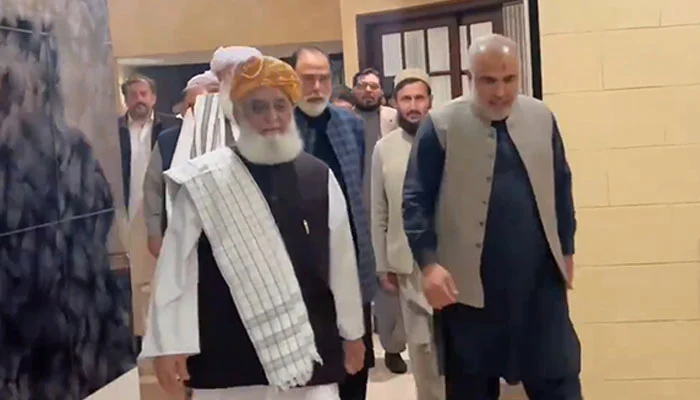In a recent development, leaders from Pakistan Tehreek-e-Insaf (PTI) and Jamiat Ulema-e-Islam-Fazl (JUI-F) convened to discuss strategies aimed at strengthening opposition efforts against the current government. The meeting, held at the Parliament Lodges, included PTI Secretary General Salman Akram Raja and former National Assembly Speaker Asad Qaiser, alongside JUI-F representatives Senator Kamran Murtaza and MNA Maulana Abdul Ghafoor Haideri.
During the discussions, Raja conveyed PTI Chairman Imran Khan’s message emphasizing unity among opposition parties to uphold the rule of law and the Constitution. In response, JUI-F leaders presented their party chief Maulana Fazlur Rehman’s concerns regarding the formation of a grand alliance. The dialogue also explored collaborative approaches within the parliament on pressing national issues and prospective legislation.
This meeting follows previous interactions between the two parties, including a formal invitation extended by PTI to JUI-F in January to join the opposition alliance, Tehreek Tahafuz Ayeen-e-Pakistan (TTAP). Despite these overtures, progress toward a unified opposition front has been hindered by unresolved reservations and conditions set forth by JUI-F. Notably, remarks made by Khyber Pakhtunkhwa Chief Minister Ali Amin Gandapur targeting JUI-F chief Fazl have caused tensions, potentially impeding alliance efforts.
As PTI intensifies its campaign to form a grand opposition alliance, the party has reached out to various political entities, including ex-premier Shahid Khaqan Abbasi, aiming to launch an anti-government movement post-Eid ul Fitr. The success of these endeavors hinges on addressing intra-opposition differences and fostering a cohesive strategy to challenge the ruling coalition effectively.



Comments (0)
No comments yet. Be the first to comment!
Leave a Comment